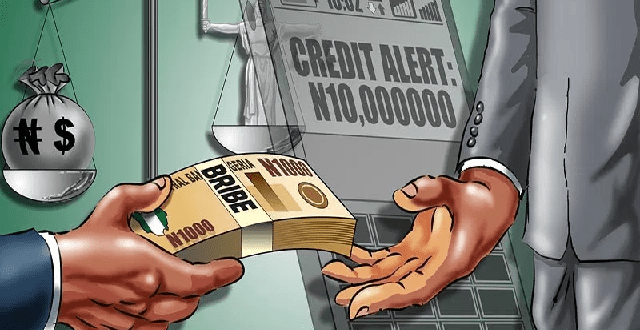The prevalence of private sector bribery in 2019 was 5.7%, while the prevalence of public sector bribery was 30%.
The number of bribes paid per bribe-payer to private sector employees in the 12 months was 3.3 versus 6.0 paid to public officials. The prevalence of private sector bribery was virtually the same in 2019 as in 2016 (5.5%), whereas the average number of bribes paid increased from 2.4 to 3.3.
Highlights
- Direct bribery requests by a public official accounted for 60% of all bribery transactions in Nigeria in 2019, representing a moderate decrease from the 66% recorded in the 2016 survey.
- As in 2016, indirect requests for a bribe accounted for 20% of all bribery transactions, while spontaneous payments to facilitate or accelerate a procedure accounted for 8%.
- About 5% of bribes were also paid with no prior request from the bribe-taker as a sign of appreciation to a public official for services rendered.
- 67% is paid before a service is provided by a public official, according to the 2019 survey, a proportion only slightly smaller than the 70% recorded in the 2016 survey. The consistently large share of bribes paid in anticipation of a service to be rendered by a public official is an indication that bribes are often requested before action is taken to deliver a service.
- The economic cost of bribery becomes even more palpable when considering that, on average, bribe-payers pay an amount equivalent to 6% of the average annual income of Nigerians. that year, corresponding to 0.52% of the entire Gross Domestic Product (GDP) of Nigeria.
Why bribes are paid to public officials
The report disclosed that almost one out of every two bribes (45%) are paid for the purpose of speeding up or finalizing an administrative procedure. The fact that the majority of bribes are requested by public officials and are paid in advance of a service is a strong indication that such bribes are paid by citizens in exchange for a service.
Cash takes the lead
More than 93% of all bribes paid in 2019 were in cash, a slightly larger share than in 2016. The average cash bribe paid is N5,754, a sum equivalent to roughly $52 in Purchasing Power Parity (PPP).

Who pays?
The report stated that women living in rural areas are those least likely to pay bribes (21.6%), whereas men living in urban areas are the most likely (39.3%). To a lesser extent, there was also a consistent disparity between men and women in the average number of bribes paid.
When looking at the age-specific pattern of bribery prevalence by sex, an interesting aspect about the age of bribe-payers in Nigeria can be observed: at a prevalence of 39 per cent, the peak among men aged 25–34 is much more pronounced, while there is almost no variation across age groups among women.
Which region had what?
The North-Central, South-East and South-South zones recorded increases in the prevalence of bribery from 2016 to 2019: the biggest increase occurred in the North Central zone, where the prevalence of bribery rose from 29.1 to 32.6% (a statistically significant increase), while the other two zones recorded smaller increases.
Who instigates bribes?
Indeed, in Nigeria, the vast majority of bribery requests are made in the form of a direct request by a public official. Direct bribery requests by public officials accounted for 60 per cent of all bribery transactions in 2019, representing a moderate decrease from the 66 per cent recorded in the 2016 survey.
As in 2016, indirect requests for a bribe accounted for 20% of all bribery transactions, while spontaneous payments to facilitate or accelerate a procedure accounted for 8%. Finally, 5% of bribes were paid with no prior request, as a sign of appreciation to a public official for services rendered.
Source: nairametrics




